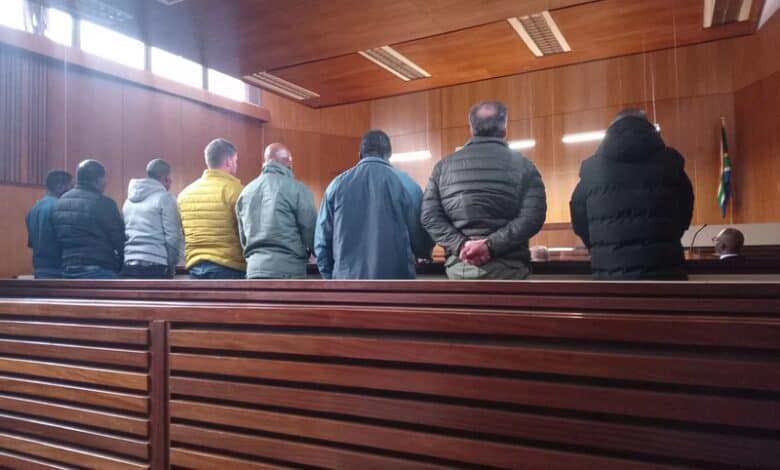
The case against the Pampoenkraal farm eight murder accused continued today at the Middelburg High Court.
The defence had previously closed its case, and the matter was scheduled for arguments by both parties.
Zenzele Mzikayise Yende (48), Werner Potgieter (48), Moses Dlamini (59), Masodeni Elliot Msongelwa Dlamini (61), Cornelius Lourens Greyling (26), Sikhumbuzo Zikalala Nhlabathi (25), Mzwakhe Dlamini (48), and Nkosinathi Msibi (26) are accused of the alleged murder of Sifiso Thwala and Musa Nene, and the alleged attempted murder of Sthembiso Thwala on August 9, 2020.
They are also facing charges of kidnapping and defeating the ends of justice.
The state had 11 witnesses who gave testimony in the case, with three witnesses, Zenzele Coka, Sibonelo Vilakazi, and Sthembiso Thwala giving extensive testimony into the events that transpired that night. Coka and Vilakazi previously gave detailed accounts of the nature and extent of the assaults that allegedly happened on that fateful night.
The state, represented by Advocate Themba Lusenga, presented its arguments to the court.
Advocate Lusenga told the court that all the accused were placed on the scene of the incident by the witnesses called by the state, with Vilakazi detailing who arrived when and who did what.
He further put it to the court that Vilakazi’s evidence was extensively corroborated by Coka, and both their statements were further backed up by Thwala’s testimony in court.
Adv. Lusenga said that not only was Potgieter identified in court by Thwala, but he was also identified by a Constable Msibi, who was on the scene on August 10, 2020.
According to Msibi, during his testimony, Thwala pointed out Potgieter as having been at the scene when they were assaulted, although he argued that he had an alibi for that night and was not at the scene.
Lusenga told the court that the defence in their arguments said the five initial statements made by some of the accused to their lawyer after the incident should be accepted by the court as the correct version of the events that happened that day.
Post-mortem report arguments:
He referred to the post-mortem report in support of his argument.
Lusenga said he finds this submission to be problematic because the statements do not account for the extensive injuries sustained by the two deceased and Thwala.
A post-mortem report of the deceased was previously presented as evidence in court.
According to the report, Sfiso Thwala’s body had multiple bruises, and he suffered a subdural haemorrhage.
The bruises were said to have been caused by different objects.
Lusenga argued that the five statements only account for the use of one object, a stick, which was allegedly used to assault the victims.
The court asked if it was not possible that the bruises were caused when the two victims fell and hit a fence. The state said it is not possible because the report mentioned that the bruises were on the whole body.
Lusenga submitted that the fence couldn’t cause the bruising that covered the whole body.
He further argued that the statements do not explain what may have caused the subdural haemorrhage.
“The defence tried to confine the subdural haemorrhage to when the victims fell and hit the ground; however, the cross-examination of the post-mortem report clarified that the injury is in line with a person who fell, but cannot be limited only to that,” said Lusenga.
Lusenga submitted to the court that it would be disingenuous to confine the subdural haemorrhage to a fall, when it was testified that there was trauma caused by blunt force.
He further argued that in Vilakazi’s testimony, he testified that the statements were fabricated, and this was further supported by what he calls Potgieter’s paranoia on August 10, when he allegedly prevented the other accused from speaking to the police about what had happened.
The alibi defence:
Greyling also argued that he had an alibi that day and was not on the scene, although witnesses placed him on the scene as having arrived later on, and they further described his participation in the assaults.
Moses Dlamini claimed he had an alibi and said he was at home on the day of the incident, caring for his elderly mother, although three different witnesses placed him on the scene.
Msongelwa Dlamini was previously identified as the one who went to the car and took out a cloth and Vaseline, used to bathe the victims. The fractures of one of the victims were also alleged to be from when Msongelwa was assaulting that victim.
Mzwakhe Dlamini was also placed on the scene as the person who allegedly brought the cattle prodder that was used to shock the victims.
Lusenga argued that at no point did Mzwakhe dissociate himself with what was taking place that night. He said that by Mzwakhe staying on the scene, he associated himself with the actions or events that transpired that night.
